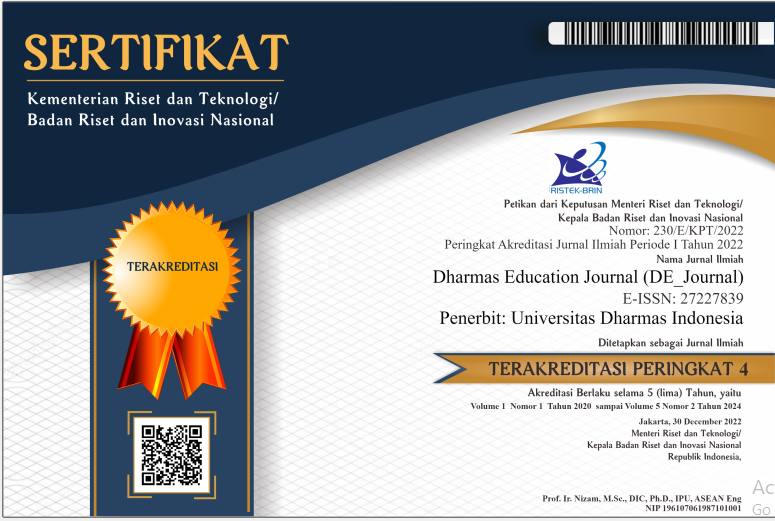ANALYSIS OF IMPOLITENESS COMMENTS OF NETIZEN ON NAJWA SHIHAB YOUTUBE CHANNEL
DOI:
https://doi.org/10.56667/dejournal.v3i1.1293Keywords:
Impoliteness, Netizen, comments, YouTube, Najwa Shihab.Abstract
This study is entitled "Analysis of Impoliteness Comments of Netizens on Najwa Shihab YouTube Channel". This study aims to examine the types of impoliteness strategies used by netizens in speaking in the comments column of Najwa Shihab's YouTube channel on the show "Ganjar Pranowo Bicara Gagasan" based on Jonathan Culpeper’s theory. In this study, the research design used is a qualitative descriptive method to analyze the types of impoliteness strategies used by netizens in commenting on the comment section of Najwa Shihab's YouTube channel on the "Ganjar Pranowo Bicara Gagasan" video uploaded in September 2023. Data will be obtained from transcripts of printed materials related to incivility, with Culpeper's theory as the basis of analysis. The results of this study identified four types of impoliteness strategies from 100 comments studied contain impoliteness strategies on the video, the four categories of impoliteness identified include: Bald on Record Impoliteness (25%), Positive Impoliteness (22%) with Insukting Others (3%), Rejecting Similarities with the Listener (1%), Diverting Topics that are Sensitive or do not want to be Discussed (5%), Using Inappropriate Code (1%), Not Interested in Conversation (6%), Look For Differences Opinion (4%), and Using Unclear and Confidential Language (2%), negative impoliteness (26%), and Sarcasm or Mock impoliteness (27%), while Withhold Politeness is not found because it can only be found in oral speech. Based on the analysis, Sarcasm or Mock Impoliteness (27%) is the most dominant type of impoliteness strategy. From these findings, it can be concluded that Indonesian netizens often express meanings that are opposite to the words they actually say, which aims to criticize or make fun of their interlocutors in a subtle way.
Downloads
References
Brown, P., & Levinson, S. (1978). Impoliteness : Some Universals in Language Usage. Cambridge University Press.
Culpeper, J. (1996). Towards an anatomy of impoliteness. Journal of Pragmatics, 25(3), 349–367. https://doi.org/10.1016/0378-2166(95)00014-3
Elain Chaika. (1982). Language the Social Mirror. Newbury House Publisher, Inc.
Hasmi, M. (2013). A Pragmatic Analysis Of Politeness Strategies Reflected In Nanny Mcphee Movie Presented as a Partial Fulfillment of the Requirements for the Attainment of a Sarjana Sastra Degree in English Language and Literature English Language And Literature Study Program English Education Department Faculty Of Languages And Arts.
Hendar, H., Nadia Astarina, A., Heryono, H., & Zuraida, I. (2022). Impoliteness Strategies on Online Comments at Kompas TV YouTube Channel: A Pragmatics Analysis Corresponding Email Article’s History. 9(2), 2022. https://doi.org/10.30605/25409190.480
Irawati, R. A., Sujatna, E. T. S., & Yuliawati, S. (2023). Strategi ketidaksantunan sarkasme warganet pada kolom komentar Instagram Ganjar Pranowo. Diglosia: Jurnal Kajian Bahasa, Sastra, Dan Pengajarannya, 6(3), 911–930. https://doi.org/10.30872/diglosia.v6i3.739
Islam Negeri Maulana Malik Ibrahim Malang, U., & Meinarni Susilowati, A. (2018). IMPOLITENESS STRATEGIES AND POWER PERFORMED BY PRESIDENT DONALD TRUMP ON TWITTER THESIS Presented to.
Jonathan Culpeper. (2005). Impoliteness and entertainment in the television quiz show: The Weakest Link. Journal of Politeness Research: Language, Behavior, Culture , 1, 35–72.
Jonathan Culpeper. (2011). Impoliteness: Using Language to Cause Offense. Cambridge University Press.
Junita Ningrum, D., & Dian Eka Chandra Wardhana Program Studi Pendidikan Bahasa Indonesia Jurusan Pendidikan Bahasa dan Seni, dan. (n.d.). KAJIAN UJARAN KEBENCIAN DI MEDIA SOSIAL.
Kunci, K., & Tutur, T. (2023). Jurnal Ilmiah Pendidikan Bahasa. In Sastra Indonesia dan Daerah (Vol. 13, Issue 2).
Lestari, D., Firmansyah, D., & Solihat, I. (2023). UJARAN KEBENCIAN NETIZEN PADA KOLOM KOMENTAR DI INSTAGRAM BEM KBM UNTIRTA TAHUN 2022 (KAJIAN LINGUISTIK FORENSIK). NUSRA: Jurnal Penelitian Dan Ilmu Pendidikan, 4(3), 766–773. https://doi.org/10.55681/nusra.v4i3.1449
Mara Shinta, V., & Wahyuni, D. (n.d.). E-Journal of English Language & Literature IMPOLITENESS STRATEGIES USED BY SUPPORTERS AND DETRACTORS OF AHOK IN THEIR ONLINE COMMENTS BY GENDER. E-Journal of English Language and Literature, 7(1). http://ejournal.unp.ac.id/index.php/jell
Meiratnasari, A., & Wijayanto, A. (n.d.). ELS-JISH ELS Journal on Interdisciplinary Studies on Humanities An analysis of Politeness Strategies in Indonesian English Textbooks. Indonesian English Textbooks. ELS Journal on Interdisciplinary Studies in Humanities, 2(4), 529–540. http://journal.unhas.ac.id/index.php/jish
Nurfitriyan, E., & 17320045, N. (2021). Expressive Speech Acts in Netizens’ Comments On The Uk’s First Covid-19 Vaccine Issue On BBC Channel Thesis.
Primadianti, N. (n.d.). A Pragmatic Analysis Of Impoliteness In Paranorman Movie. In A Pragmatic Analysis .... (Nabella Primadianti) (Vol. 3).
Rahardi, R. K., Setyaningsih, Y., Rishe, D., & Dewi, P. (n.d.). Kata Fatis Penanda Ketidaksantunan Pragmatik Dalam Ranah Keluarga.
Ryabova, M. (2015). Politeness Strategy in Everyday Communication. Procedia - Social and Behavioral Sciences, 206, 90–95. https://doi.org/10.1016/j.sbspro.2015.10.033
Stephen.C. Levinson. (1982). Pragmatics. Cambridge University Press.
Subyantoro. (2019). Forensic Linguistics: Contribution of Language Studies in Law Enforcement. Indonesian Fair Journal, 1(1).
Sugiyono. (2007). Statistika Untuk Penelitian. Tarsito.
Suharsimi Arikunto. (2006). Prosedur Penelitian Suatu Pendekatan Praktik. Rineke Chipta.
Downloads
Published
How to Cite
Issue
Section
License
Copyright (c) 2025 Dharmas Education Journal (DE_Journal)

This work is licensed under a Creative Commons Attribution-NonCommercial-NoDerivatives 4.0 International License.
Makalah yang disampaikan diasumsikan tidak mengandung bahan propietary yang tidak dilindungi oleh hak paten














